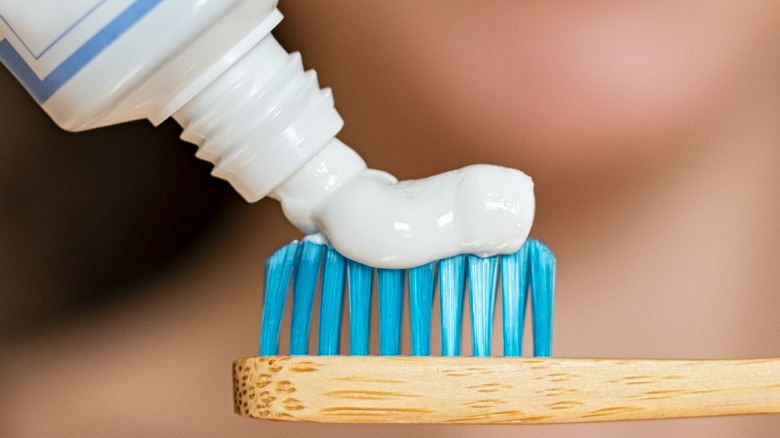Are Whitening Toothpastes Bad For Your Teeth?
Who doesn't love a gorgeous smile with white gleaming teeth? If you want to naturally give your teeth a pearly look, the best way to start is by regularly brushing and flossing while following dentist-recommended techniques, according to Healthline. This helps remove plaque formation that destroys the enamel (the upper-most layer), which makes teeth appear to be yellow. Plaque is usually formed by multiple layers of food that gradually erode the enamel and lead to discoloration.
The truth is that achieving sparkling white teeth isn't an easy feat and requires a lot of effort. In 2020 alone, 37 million people in the US used some kind of teeth whitening agent (via Statistica). Thus, it goes without saying that people aren't afraid to spend big on getting dreamy white teeth and enhancing their overall beauty. At the same time, it's also necessary to keep in mind that using too many harsh chemicals can have adverse effects and damage the health of your teeth in the process.
Is it okay to use a teeth whitening toothpaste?
Whitening toothpaste remains among the most affordable ways to get rid of stains and regain the original beauty of your teeth. WebMD reports that these products are generally less harsh and have no bleach. They also have a mild effect on teeth whitening and might only remove stains to a limited extent. For better results, you may want to visit a dentist for a professional whitening procedure. However, keep in mind that it possesses risks, and it might not be best for everyone.
According to experts at Dentistry of West Bend, it's fine to use teeth whitening toothpaste, but what really matters is the type of toothbrush you use and the technique of brushing. They emphasize that most of the whitening toothpaste on the market has the seal of approval from the American Dental Association (ADA) and the US Food and Drug Administration (FDA). The FDA categorizes the safety of whitening toothpaste by assessing their Relative Dentin Abrasivity (RDA) score. Below 249 is regarded as safe and anything above this threshold holds risk for your tooth enamel.


